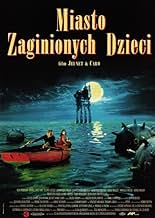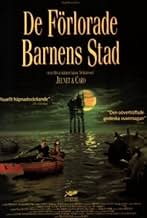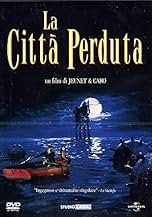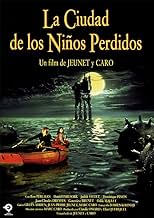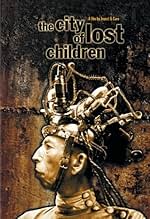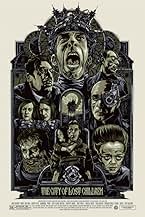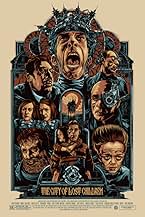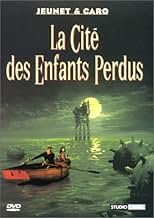Un savant dans une société surréaliste kidnappe des enfants pour voler leurs rêves, espérant ainsi ralentir son vieillissement.Un savant dans une société surréaliste kidnappe des enfants pour voler leurs rêves, espérant ainsi ralentir son vieillissement.Un savant dans une société surréaliste kidnappe des enfants pour voler leurs rêves, espérant ainsi ralentir son vieillissement.
- Réalisation
- Scénario
- Casting principal
- Récompenses
- 5 victoires et 14 nominations au total
Geneviève Brunet
- La Pieuvre
- (as Genevieve Brunet)
Mapi Galán
- Lune
- (as Mapi Galan)
Briac Barthélémy
- Bottle
- (as Briac Barthelemy)
Léo Rubion
- Jeannot
- (as Leo Rubion)
Avis à la une
I can't help myself: I adore this film. I freely accept that it's not going to be everyone's cup of tea; if pushed, I might even accept that it's not perfect. But there's no film I love more, or more enjoy re-watching. One caveat though: I've seen both the subtitled and the dubbed print, and the English dubbing frankly comes close to ruining the movie. Ron Perlman dubs himself and is fine, and some of the other adult English actors are perfectly OK, though they tend to be blander than the French originals. But most of the children are terrible, and with her own voice it's Judith Vittet's extraordinary performance (all the more extraordinary considering she was nine at the time) that helps give "La Cité" the genuine emotional centre that some viewers don't feel it has.
But I'll come back to that. In any version, at least Jeunet and Caro's astonishing visual flair and artistry come over. I can't think of a film that has such a concentration of memorable shots - time and again, especially watching on DVD with a freeze-frame facility, you realize how many beautiful compositions Jean-Pierre Jeunet gives us: though the cast of characters could easily fill a freak show, and the sets are dark and quite unglamorous in themselves, the cinematography is gorgeous and the mise-en-scène often strangely elegant. It has a look all of its own, perfect for a modern, urban fairy-tale. The music too is gorgeous, one of the finest scores by David Lynch's regular musical collaborator, Angelo Badalamenti.
"Fairy tale" is I think the best generic starting-point for this film, so long as you think Grimm rather than Disney. (Unlike "Delicatessen", it isn't really a comedy, though it has comic elements). And the plot works according to its own logic, even if the progression from scene to scene is occasionally a bit lumpy or obscure. Krank (the astonishing Daniel Emilfork), grown prematurely old because he cannot dream, uses a cult of blind, messianic preachers to abduct children from a decaying industrial port and steal their dreams - but they have only nightmares, and Krank falls ever deeper into despair and evil. It's up to the orphan pickpocket Miette and a none-too-brainy circus strongman, One, to put a stop to him. This rich idea is elaborated with all sorts of visual conceits and eccentric characters - Jeunet mounts, for example, a couple of astonishing sequences in which chains of unlikely effects proceed from the smallest of causes - but never at the expense of the central relationship of One and Miette.
In a sense Miette, like Krank, has grown old too fast: the orphaned street-children of this city are savvy and unsentimental, and never seem to have had a childhood; meanwhile there's something deeply childish, in various ways, about most of the adults. Sensitively directed and never overacting, Judith Vittet's Miette gradually thaws, and Ron Perlman brings a lot of sympathy and pathos to what could have been an oafish, cartoonish role: Jeunet gives plenty of space and subtlety to their gradually-developing friendship, and dares to do what I suspect no English director would dare to do at the moment, which is to make their relationship innocently sexualized. Neither of them is really a grown-up, but it's still an extremely risky move, exploring the first stirrings of pre-pubescent sexuality while trying not to be exploitative or prurient. I do think the film pulls it off, though I can imagine some viewers feeling distinctly uncomfortable with it. For me it's one of the most convincingly unsentimental and nuanced (if mannered) portrayals of childhood I've ever seen on the screen, and there is real compassion and tenderness along the way, as well as some darker twists and turns.
It's a film that rewards analysis if you're prepared to surrender to its strange world with its strange rules. But it rewards the senses and the emotions too - and it radiates love of cinema as the perfect medium for sophisticated fantasy. One elderly actress who appears towards the end (Nane Germon) acted - as Jeunet's DVD commentary points out - in Jean Cocteau's "La Belle et la Bête" about fifty years earlier (there are, by the way, distinct references to the Beauty and the Beast story here), and "La Cité des enfants perdus" deserves to join that film as one of the classic cinematic fairy-tales. Pity about Marianne Faithfull over the closing credits, though!
But I'll come back to that. In any version, at least Jeunet and Caro's astonishing visual flair and artistry come over. I can't think of a film that has such a concentration of memorable shots - time and again, especially watching on DVD with a freeze-frame facility, you realize how many beautiful compositions Jean-Pierre Jeunet gives us: though the cast of characters could easily fill a freak show, and the sets are dark and quite unglamorous in themselves, the cinematography is gorgeous and the mise-en-scène often strangely elegant. It has a look all of its own, perfect for a modern, urban fairy-tale. The music too is gorgeous, one of the finest scores by David Lynch's regular musical collaborator, Angelo Badalamenti.
"Fairy tale" is I think the best generic starting-point for this film, so long as you think Grimm rather than Disney. (Unlike "Delicatessen", it isn't really a comedy, though it has comic elements). And the plot works according to its own logic, even if the progression from scene to scene is occasionally a bit lumpy or obscure. Krank (the astonishing Daniel Emilfork), grown prematurely old because he cannot dream, uses a cult of blind, messianic preachers to abduct children from a decaying industrial port and steal their dreams - but they have only nightmares, and Krank falls ever deeper into despair and evil. It's up to the orphan pickpocket Miette and a none-too-brainy circus strongman, One, to put a stop to him. This rich idea is elaborated with all sorts of visual conceits and eccentric characters - Jeunet mounts, for example, a couple of astonishing sequences in which chains of unlikely effects proceed from the smallest of causes - but never at the expense of the central relationship of One and Miette.
In a sense Miette, like Krank, has grown old too fast: the orphaned street-children of this city are savvy and unsentimental, and never seem to have had a childhood; meanwhile there's something deeply childish, in various ways, about most of the adults. Sensitively directed and never overacting, Judith Vittet's Miette gradually thaws, and Ron Perlman brings a lot of sympathy and pathos to what could have been an oafish, cartoonish role: Jeunet gives plenty of space and subtlety to their gradually-developing friendship, and dares to do what I suspect no English director would dare to do at the moment, which is to make their relationship innocently sexualized. Neither of them is really a grown-up, but it's still an extremely risky move, exploring the first stirrings of pre-pubescent sexuality while trying not to be exploitative or prurient. I do think the film pulls it off, though I can imagine some viewers feeling distinctly uncomfortable with it. For me it's one of the most convincingly unsentimental and nuanced (if mannered) portrayals of childhood I've ever seen on the screen, and there is real compassion and tenderness along the way, as well as some darker twists and turns.
It's a film that rewards analysis if you're prepared to surrender to its strange world with its strange rules. But it rewards the senses and the emotions too - and it radiates love of cinema as the perfect medium for sophisticated fantasy. One elderly actress who appears towards the end (Nane Germon) acted - as Jeunet's DVD commentary points out - in Jean Cocteau's "La Belle et la Bête" about fifty years earlier (there are, by the way, distinct references to the Beauty and the Beast story here), and "La Cité des enfants perdus" deserves to join that film as one of the classic cinematic fairy-tales. Pity about Marianne Faithfull over the closing credits, though!
How can you not love this movie? From the amazingly talented team of Marc Caro and Jean-Pierre Jeunet comes this superbly original fantasy tale, that just oozes inventiveness and drags you into it's world, where it's all too easy to completely lose yourself. Caro and Jeunet were, of course, the good people behind the brilliant 'Delicatessen'. The City of Lost Children is kind of like Delicatessen mark 2. The style is still there in droves, except in this film it's much more abundant, and while Delicatessen had a base in reality, The City of Lost Children can easily be classified simply as 'pure' fantasy. The film is very French, and even if you didn't know where it's makers came from, you'd be able to guess. The French style is great anyway, and an excellent base to make a movie from, but when it's mixed with Jeunet's personal style, we've got a movie on our hands! That's exactly what this film is too; pure cinema. This is the sort of experience that I watch movies for, and so the film gets a huge thumbs up on that front.
The plot follows a man named Krank. Krank ages prematurely because he cannot dream, thus leading him to kidnap the local children and attempt to steal their dreams. However, as Krank is many a child's worst nightmare, that's exactly what he gets; nightmares, which just isn't good enough. The fun starts when Krank's men kidnap the brother of strongman Ron Perlman, who then sets out with a young orphan girl to find him. The two leads; Ron Perlman and Judith Vittet do a magnificent job of carrying the film, and their very different appearances and persona's blend well with one another. Judith Vittet really does steal the show all on her own, however, as her performance is far more mature than you would expect from an actress so young. It's a shame she only has four film credits to her name. It's not the actors that are the real stars of this film however, as the surrealistic style just steals every scene. You spend most of the movie simply admiring the lavish settings and absolutely sublime uses of CGI.
As mentioned, this is exactly the sort of production that cinema was invented for. The inventiveness on display is simply stunning and puts just about every other film in it's class to shame. Jean-Pierre Jeunet is one of today's finest filmmakers, and along with a select group of individuals is one of the few directors left that are still capable of a masterpiece. And that's exactly what this film is; a masterpiece.
The plot follows a man named Krank. Krank ages prematurely because he cannot dream, thus leading him to kidnap the local children and attempt to steal their dreams. However, as Krank is many a child's worst nightmare, that's exactly what he gets; nightmares, which just isn't good enough. The fun starts when Krank's men kidnap the brother of strongman Ron Perlman, who then sets out with a young orphan girl to find him. The two leads; Ron Perlman and Judith Vittet do a magnificent job of carrying the film, and their very different appearances and persona's blend well with one another. Judith Vittet really does steal the show all on her own, however, as her performance is far more mature than you would expect from an actress so young. It's a shame she only has four film credits to her name. It's not the actors that are the real stars of this film however, as the surrealistic style just steals every scene. You spend most of the movie simply admiring the lavish settings and absolutely sublime uses of CGI.
As mentioned, this is exactly the sort of production that cinema was invented for. The inventiveness on display is simply stunning and puts just about every other film in it's class to shame. Jean-Pierre Jeunet is one of today's finest filmmakers, and along with a select group of individuals is one of the few directors left that are still capable of a masterpiece. And that's exactly what this film is; a masterpiece.
The City of Lost Children gets two platinum stars and also moves up to one of my top ten favorite films of all time. This is a confusing story, from beginning to end it expands your mind, reaches into your nightmares, and creates a story that is part Dark City and part of a novel called "The Golden Compass" by Phillip Pullman.
Yes, this film was everything and more. Not only visually beautiful, but the creative and symbolic meaning of the actions and words of the characters are "jaw dropping". Also, there are so many sub-stories in this film that reminded me of the style that Run Lola Run was done. This is the style that due to a connection of unrelated events something extraordinary happens. Let me give you an example from this film: There is a scene where the girl and One (Ron Pearlman-also a very biblical name) are trying to escape from the two women who want their jewels. There are events that lead from a dog finding its female companion to a boat almost hitting/splitting the women in half. Wild coincidences...imagine this times ten, and you have this film.
Keep in mind this is a French film with English subtitles, so you are not only getting the true voice of the film, but seeing the darkness of the cinematography without any American input. This really shows the purpose behind making this film, it really takes you to a new place so dark and dreamlike that you the viewer actually feel like you are in the picture itself. A movie about dreams and nightmares that takes place in a world of dreams and nightmares.
Overall, a heavily religious and symbolic film, The City of Lost Children should be put at the top of your foreign film list. Put it in your DVD player, open your mind, and be ready for a wild and intense ride!!
Grade: ***** out of *****
Yes, this film was everything and more. Not only visually beautiful, but the creative and symbolic meaning of the actions and words of the characters are "jaw dropping". Also, there are so many sub-stories in this film that reminded me of the style that Run Lola Run was done. This is the style that due to a connection of unrelated events something extraordinary happens. Let me give you an example from this film: There is a scene where the girl and One (Ron Pearlman-also a very biblical name) are trying to escape from the two women who want their jewels. There are events that lead from a dog finding its female companion to a boat almost hitting/splitting the women in half. Wild coincidences...imagine this times ten, and you have this film.
Keep in mind this is a French film with English subtitles, so you are not only getting the true voice of the film, but seeing the darkness of the cinematography without any American input. This really shows the purpose behind making this film, it really takes you to a new place so dark and dreamlike that you the viewer actually feel like you are in the picture itself. A movie about dreams and nightmares that takes place in a world of dreams and nightmares.
Overall, a heavily religious and symbolic film, The City of Lost Children should be put at the top of your foreign film list. Put it in your DVD player, open your mind, and be ready for a wild and intense ride!!
Grade: ***** out of *****
The evil Krank (Daniel Emilfork), his dwarf wife and his clone minions children (Dominique Pinon) have a machine to steal the dreams of young children because Krank can't have dreams himself. One (Ron Perlman) is a strong man performer whose little brother Denree is kidnapped by Krank's underlings, the Cyclops. Miette (Judith Vittet) is a young street kid who ends up helping him.
This has a lot of weird concepts on display. I can only describe this a outlandish mix of Dickensian poverty and a french grimy Jules Verne sci-fi with a good helping of weird surrealism. The visual is a good unique grim fairy tale but the story drags a little too much. It meanders and is confused. It is in love with its visual surrealism more than trying to make sense with the story. It should be a lot more simpler than what it is. It spends a lot of time luxuriating in the weirdness of the world and the villain.
This has a lot of weird concepts on display. I can only describe this a outlandish mix of Dickensian poverty and a french grimy Jules Verne sci-fi with a good helping of weird surrealism. The visual is a good unique grim fairy tale but the story drags a little too much. It meanders and is confused. It is in love with its visual surrealism more than trying to make sense with the story. It should be a lot more simpler than what it is. It spends a lot of time luxuriating in the weirdness of the world and the villain.
"City of Lost Children" is a beautifully-realized if derivative dark fantasy in which a mad scientist named Krank, aided by a half-dozen clones, a midget woman, and a brain in a tank, abducts children to his offshore lab so he can steal their dreams. Seems he's unable to have any of his own. A sideshow strongman, played by a radiantly fit Ron Perlman, goes in search of his little brother, who has been taken by Krank's goons. Perlman, in another of his growing gallery of bizarre roles, is a perfect example of why I like character actors better than big-name stars. And how many languages does he speak, anyway? French here, Spanish (and English, of course) in "Cronos"; polyglot in "The Name of the Rose"; what next?
The strongman, named One, enlists the aid of Miette, a homeless, streetwise girl who, along with her fellow urchins, is part of a ring of thieves employed by a pair of sinister female Siamese twins named the Octopus. (Watch carefully how these evil twins smoke a cigarette. There are more weird characters per square inch in this flick than anywhere else outside a Heironymus Bosch painting.) Miette is played by Judith Villet, whose gonna-be-a-great-beauty looks, her air of intelligence and experience beyond her years, make her a sort of Gallic Natalie Portman.
Anyway, that's the plot: rescue little brother from the mad doctor. The images are the thing: with its rendering of a bleak, low-tech retro-future, "City" looks more like a Terry Gilliam movie than "Twelve Monkeys" does! And it slyly slips in ideas and images from other sources, to good effect: Krank himself is as much of the mad-doctor stereotype as is the character in "The Nightmare Before Christmas"; his outlandish electro-headgear is similar to that used in Disney's "Merlin Jones"; a nightmare on the loose swoops low along the ground through streets and alleys as a trail of green mist, improving on a similar image from "Bram Stoker's Dracula"; there's a confrontation in dreamland a la the "Elm Street" series; and while the idea of a brain in a tank isn't a new one, this is the first benign one I've ever seen. Familiar or not--and I'm thinking also of "The 5,000 Fingers of Dr. T"--"City of Lost Children" is still engaging, enjoyably weird, fantastic and funny, helped greatly by the fact that One and Miette are so endearing. The pace is a tad slower than it might have been. But this is, after all, a French movie.
The strongman, named One, enlists the aid of Miette, a homeless, streetwise girl who, along with her fellow urchins, is part of a ring of thieves employed by a pair of sinister female Siamese twins named the Octopus. (Watch carefully how these evil twins smoke a cigarette. There are more weird characters per square inch in this flick than anywhere else outside a Heironymus Bosch painting.) Miette is played by Judith Villet, whose gonna-be-a-great-beauty looks, her air of intelligence and experience beyond her years, make her a sort of Gallic Natalie Portman.
Anyway, that's the plot: rescue little brother from the mad doctor. The images are the thing: with its rendering of a bleak, low-tech retro-future, "City" looks more like a Terry Gilliam movie than "Twelve Monkeys" does! And it slyly slips in ideas and images from other sources, to good effect: Krank himself is as much of the mad-doctor stereotype as is the character in "The Nightmare Before Christmas"; his outlandish electro-headgear is similar to that used in Disney's "Merlin Jones"; a nightmare on the loose swoops low along the ground through streets and alleys as a trail of green mist, improving on a similar image from "Bram Stoker's Dracula"; there's a confrontation in dreamland a la the "Elm Street" series; and while the idea of a brain in a tank isn't a new one, this is the first benign one I've ever seen. Familiar or not--and I'm thinking also of "The 5,000 Fingers of Dr. T"--"City of Lost Children" is still engaging, enjoyably weird, fantastic and funny, helped greatly by the fact that One and Miette are so endearing. The pace is a tad slower than it might have been. But this is, after all, a French movie.
Le saviez-vous
- AnecdotesTo achieve the slightly skewed color scheme of the movie, the actors were made up in white face and the color palette corrected until they were flesh-toned.
- GaffesThe words from The Original that Miette remembers in flashback (after she receives Uncle Irvin's dream message) differ slightly from what The Original actually said, although the point of the message is still the same.
- Versions alternativesThere are two different audio tracks for the film - one is the original French language version and another is an English language dub.
- ConnexionsFeatured in Les enfants de la cité perdue (1995)
- Bandes originalesWho Will Take Your Dreams Away
Music by Angelo Badalamenti
Lyrics by Marianne Faithfull
Performed by Marianne Faithfull
Meilleurs choix
Connectez-vous pour évaluer et suivre la liste de favoris afin de recevoir des recommandations personnalisées
Détails
- Date de sortie
- Pays d’origine
- Sites officiels
- Langues
- Aussi connu sous le nom de
- La ciudad de los niños perdidos
- Lieux de tournage
- Sociétés de production
- Voir plus de crédits d'entreprise sur IMDbPro
Box-office
- Budget
- 18 000 000 $US (estimé)
- Montant brut aux États-Unis et au Canada
- 1 738 611 $US
- Week-end de sortie aux États-Unis et au Canada
- 34 348 $US
- 17 déc. 1995
- Montant brut mondial
- 1 784 338 $US
Contribuer à cette page
Suggérer une modification ou ajouter du contenu manquant

Lacune principale
By what name was La Cité des enfants perdus (1995) officially released in India in English?
Répondre

